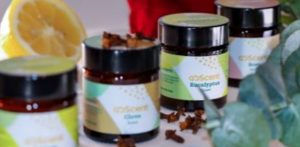Tips to regain your sense of taste and smell after Covid #Blog
Victoria Hayes
22nd July 2021

A loss of taste and smell are among the most common symptoms associated with Covid-19 as infection rates continue to rise across the UK.
A loss of the senses is also associated with Long Covid, also known as post-Covid syndrome, is used to describe the effects of the virus that continue for weeks or months beyond the initial illness.
Recovery from the illness, responsible for the global pandemic, can often take weeks or even months with about one in 10 cases leaving taste and smell problems after coronavirus infection.
A loss of smell will affect how people can detect flavours, when we eat, the flavour of food is the combined experience of smell and taste.
It is worth noting that the loss of smell which will also affect your taste is not usually serious and should get better after a few weeks or months. 
A cold or flu, sinusitis, allergies and growths in your nose can all be causes of a lost sense of smell however un the current climate it could be a sign that you have or have had Covid-19.
If you are suffering from a loss of smell since contracting coronavirus the NHS has issued advice on how to regain your senses.
Cleaning the inside of your nose
Rinsing the inside of your nose with a saltwater solution may help if your sense of smell is affected by an infection or allergy.
Sachets for saltwater solution and devices to help rinse out your nose will be available at some pharmacies throughout the UK although the NHS has provided guidance on how to create it at home.
- Boil a pint of water, then leave it to cool.
- Mix a teaspoon of salt and a teaspoon of baking soda (bicarbonate of soda) into the water.
- Wash your hands.
- Stand over a sink, cup the palm of 1 hand and pour a small amount of the solution into it.
- Sniff some of the solution up 1 nostril at a time and let it run out of your nose. It might help to hold your other nostril closed with your finger as you sniff.
- Repeat these steps a few times to see if it helps.
You do not need to use all of the solution, but make a fresh batch each day – do not reuse any left over from the day before.
Treatment for lost or changed sense of smell
It is likely your loss of smell will return to normal in a few weeks or months whether that be through Covid-19 or through any of the other causes mentioned above.

Original smell training kit of rose, lemon, clove and eucalyptus The ideal starter kit for smell training, four specially blended long-lasting aromas inspired by the fragrances of the original 2009 study.
The NHS say a treatments called “smell training” could help.
Smell training is actively sniffing the same four scents every day, spending around 20 seconds on each scent and really concentrating on what you’re doing.
For more information you can visit abScent.org.
If your sense of smell or taste does not go back to normal within a few weeks it is worth seeking medical advice from your GP.
They will check for obvious causes and may refer you to a specialist for tests.
More information regarding Covid-19 and a loss of taste and smell can be found on the NHS website.
Our friend and life kitchen founder Ryan Riley is also on hand to help.
Ryan has launched the WORLD’S FIRST, FREE cookbook for people experiencing taste and smell changes as a result of long covid. Developed in partnership with Kimberley Duke and based on the research from Abscent, Altered Eating and their own independent testing. These recipes are also recommended for those whose taste buds have been battered by chemo and it’s wonderful. He hopes his latest cookbook provides ample inspiration for better-tasting alternatives.
“Taste & Flavour had to be different because of Covid,” said Riley. “We had to flip what we knew about writing recipes on its head.”
As cofounders of Life Kitchen, a not-for-profit cookery school for people whose taste has been affected by cancer treatment, Riley and Duke have been experimenting with food flavours since 2018.
However, a distorted sense of smell is a symptom of Covid-19 and can make everyday foodstuffs like vegetables and coffee taste disgusting. So Riley had to rethink the recipes from scratch.
“That’s what makes this book so unique,” he said. “We’re not just relying on garlic and onions, and all of the typical flavour profiles.”
In search of alternatives, they consulted food scientists, who suggested combining the five flavour elements – aroma, umami, texture, layering, and trigeminal food sensations (the tingling sensation from spices) – to create their meals.
The results include dishes ranging from fiery tomato soup with sesame seed butter toast, to veggie pineapple tacos with red peppers and feta.
Gillian Dixon, who caught Covid-19 in January, was one of the first people to try the book. She has been experiencing anosmia (a loss of smell) for almost a year. 
“The recipes are absolutely brilliant,” said Dixon, who has so far turned her hand to the cherry and almond tarts, and the preserved lemon, feta and za’atar twists from the book. “They really stimulate your tastebuds.”
Taste & Flavour can be downloaded for free here.
